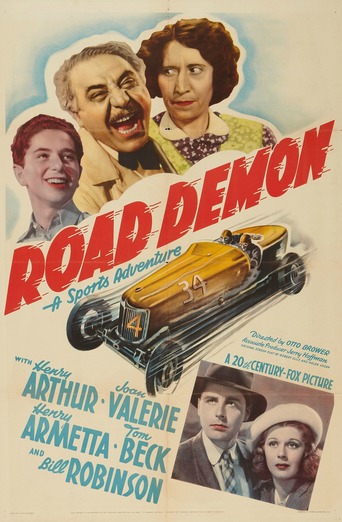Doomtomylo
a film so unique, intoxicating and bizarre that it not only demands another viewing, but is also forgivable as a satirical comedy where the jokes eventually take the back seat.
kevin olzak
1938's "Speed to Burn" introduced the Gambini family, Henry Armetta as Papa, Inez Palange as Mama, Johnny Pironne Jr. and Eleanor Virzie the two children, all returning in this sequel, "Road Demon." Aspiring race car driver Jimmy Blake (Henry Arthur) constantly calls upon Papa Gambini to help him build up a junked race car, so that he can win the heart of pretty Joan Rogers (Joan Valerie), whose race driver brother Ted (Thomas Beck) is given half the percentage. The siblings are unaware that their father was murdered by racketeers led by Anderson (Jonathan Hale), run off the track a year earlier, profiting by any means possible by ending Ted's career the same way. Edward Gargan shows up as a truck driver, while Bill 'Bojangles' Robinson plays the tap dancing junk dealer. The three drivers in Anderson's employ are played by Murray Alper, Edward J. Marr, and Lon Chaney, whose character of Bud Casey is the only one to dish it out to Anderson for the fadeout. This was a rare featured role during Chaney's two years at Fox, usually only in 'B' programmers, of which this certainly qualifies. He'd earlier played a small bit in "Speed to Burn," and does not appear in "Winner Take All," the last of the brief series, all three of which had a different supporting cast apart from the Gambini quartet, and all directed by Otto Brower.

